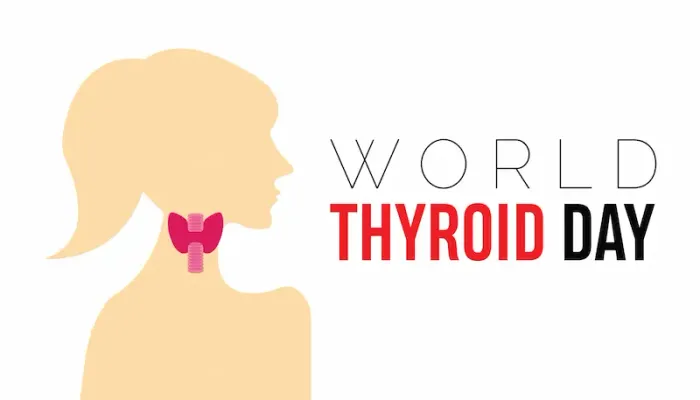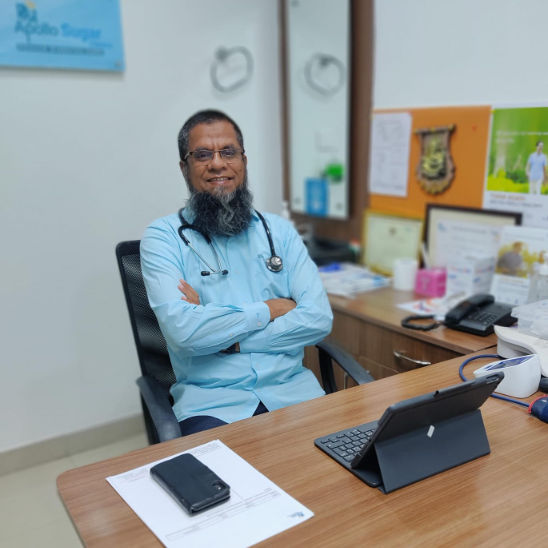World Thyroid Day: Your Guide to Symptoms, Tests & Treatment
Discover essential information on thyroid health this World Thyroid Day. Learn about common thyroid symptoms, key diagnostic tests, and effective treatment options to maintain optimal thyroid health.

Written by Dr. Siri Nallapu
Reviewed by Dr. Rohinipriyanka Pondugula MBBS
Last updated on 13th Jan, 2026

Introduction
Every year on May 25th, the global health community observes World Thyroid Day to shine a spotlight on this small, butterfly-shaped gland and its monumental role in our well-being. Often overlooked, the thyroid is the body's master regulator, influencing everything from your energy levels and weight to your mood and heartbeat. Yet, millions worldwide suffer from undiagnosed thyroid disorders, mistaking their symptoms for mere stress or aging. This article serves as your comprehensive guide. We'll demystify the thyroid gland, explore common disorders like hypothyroidism and hyperthyroidism, outline the crucial steps for diagnosis, and discuss effective management strategies. Whether you're seeking answers for yourself or a loved one, understanding thyroid health is the first step toward reclaiming your vitality.
What is World Thyroid Day?
World Thyroid Day (WTD) is an annual observance dedicated to educating the public about thyroid diseases and advocating for improved patient care and research. It’s a day for patients, healthcare professionals, and organisations to unite with a common voice.
The History and Mission of the Day
Established in 2008 by the European Thyroid Association (ETA) and later endorsed by the American Thyroid Association (ATA), WTD was created to address the growing need for global awareness. Their mission is multifaceted: to increase understanding of thyroid health, to promote prevention and early detection of thyroid diseases, and to emphasise the importance of effective treatment. The day underscores that while thyroid disorders are common, they are also highly manageable with proper medical attention.
Why Thyroid Awareness is Crucial for Public Health
Awareness is the first line of defense. Thyroid diseases are among the most prevalent endocrine disorders globally, affecting an estimated 200 million people. However, up to 60% of those affected are unaware of their condition. The symptoms—fatigue, weight changes, anxiety—are often vague and attributed to other causes. By raising awareness, World thyroid day aims to bridge this gap in knowledge, encouraging individuals to listen to their bodies and seek timely medical advice, ultimately improving long-term health outcomes.
Consult an Endocrinologist for the best advice
Understanding Your Thyroid: The Body's Master Regulator
What is the Thyroid Gland and What Does It Do?
The thyroid gland is a small, two-inch-long organ located at the base of your neck, just below your Adam's apple. Despite its size, it's a powerhouse. Its primary function is to produce, store, and release two key hormones into the bloodstream: thyroxine (T4) and triiodothyronine (T3). Think of these hormones as the body's metabolic gasoline; they travel to every tissue and organ, ensuring they have the energy to function correctly.
How Thyroid Hormones Impact Your Metabolism
These thyroid hormones are fundamental regulators of your metabolism. They control the pace at which your body converts food into energy, maintains body temperature, and ensures your heart, brain, muscles, and other organs work in harmony. When your thyroid produces too much hormone (hyperthyroidism), your body's systems speed up. When it produces too little (hypothyroidism), everything slows down. This delicate balance is why even a minor thyroid imbalance can have widespread effects on your health.
Common Thyroid Disorders You Should Know About
Hypothyroidism (Underactive Thyroid)
This occurs when the thyroid gland fails to produce sufficient hormones, causing bodily functions to slow down. It's a common thyroid disorder, especially among women.
Key Symptoms of an Underactive Thyroid
• Persistent fatigue and lethargy
• Unexplained weight gain
• Feeling cold all the time (cold intolerance)
• Dry skin and hair loss
• Depression and brain fog
• Constipation
• Heavy or irregular menstrual periods
Primary Causes of Hypothyroidism
The most common cause globally is iodine deficiency. However, in countries with iodised salt, the leading cause is Hashimoto's thyroiditis, an autoimmune disorder where the body's immune system mistakenly attacks the thyroid gland.
Hyperthyroidism (Overactive Thyroid)
This is the opposite of hypothyroidism; the gland is overactive and produces an excess of thyroid hormones, accelerating the body's functions.
Key Symptoms of an Overactive Thyroid
• Nervousness, anxiety, and irritability
• Unexplained weight loss despite increased appetite
• Rapid or irregular heartbeat (palpitations)
• Heat intolerance and excessive sweating
• Tremors in the hands and fingers
• Sleep disturbances
• Frequent bowel movements
Primary Causes of Hyperthyroidism
Graves' disease, another autoimmune disorder, is the most common cause. It prompts the thyroid to overproduce hormones. Other causes include thyroid nodules that overproduce hormones (toxic nodules) or inflammation of the thyroid (thyroiditis).
Thyroid Nodules and Goiter
Thyroid nodules are lumps that can form within the thyroid. Most are benign, but a small percentage can be cancerous. A goiter is simply an enlargement of the thyroid gland itself, which can be caused by iodine deficiency, Hashimoto's, or nodules. While often harmless, a large goiter can cause coughing or difficulty swallowing.
Thyroid Cancer
While the word "cancer" is frightening, thyroid cancer is generally one of the most treatable forms of cancer, especially when detected early. It often presents as a lump in the neck. Treatment typically involves surgery, followed by radioactive iodine therapy if needed, and has a very high success rate.
How is a Thyroid Disorder Diagnosed?
Diagnosis is straightforward and crucial for effective management.
The Essential Thyroid Function Test (TFT)
This is a simple blood test that measures the levels of thyroid-stimulating hormone (TSH), T4, and T3. TSH, produced by the pituitary gland, is the most sensitive indicator. A high TSH suggests an underactive thyroid (hypothyroidism), while a low TSH suggests an overactive thyroid (hyperthyroidism). If you're experiencing persistent symptoms, a simple TFT can provide clarity. Apollo24|7 offers convenient home collection for tests like the thyroid profile, making the process hassle-free.
Imaging: Ultrasound and Scans
If a nodule or goiter is suspected, a doctor may recommend a thyroid ultrasound. This painless test uses sound waves to create images of the gland, helping to determine the size and nature of any nodules.
When is a Biopsy Needed? (FNAC)
If a nodule appears suspicious on an ultrasound, a fine-needle aspiration cytology (FNAC) biopsy may be performed. This involves using a thin needle to extract cells from the nodule for examination under a microscope to check for cancer.
Get Your Health Assessed
Managing Your Thyroid Health: Treatment and Lifestyle
Standard Treatment Options for Thyroid Imbalance
For Hypothyroidism: The standard treatment is daily hormone replacement medication (e.g., Levothyroxine). It's a synthetic version of the T4 hormone that your body is missing.
For Hyperthyroidism: Treatment options include anti-thyroid medications to reduce hormone production, radioactive iodine therapy to disable overactive thyroid cells, or surgery to remove part or all of the gland.
The Role of Diet and Nutrition in Thyroid Function
While medication is primary, nutrition supports overall health. Iodine, selenium, and zinc are crucial micronutrients for thyroid function. However, those with Hashimoto's should be cautious with excessive iodine intake. It's best to focus on a balanced, whole-food diet. If your condition does not improve after trying these methods, book a physical visit to a doctor with Apollo24|7 for personalised dietary advice.
Exercise and Stress Management for Thyroid Patients
Regular, moderate exercise can help combat fatigue, boost mood, and manage weight—common challenges with thyroid disorders. Stress management techniques like yoga, meditation, and adequate sleep are also vital, as stress can exacerbate thyroid symptoms.
Conclusion
Understanding and caring for your thyroid is a fundamental part of taking control of your overall health. World thyroid day serves as an annual reminder of the importance of this tiny but mighty gland. The journey from experiencing vague symptoms to receiving a clear diagnosis and effective treatment can be life-changing. By recognising the signs, advocating for proper testing, and adhering to treatment, you can effectively manage a thyroid condition and live a full, healthy life. Don't dismiss persistent changes in your body. Listen to it. If you suspect a thyroid imbalance, take that first step—talk to a healthcare professional and get the answers you deserve.
Consult an Endocrinologist for the best advice
Consult an Endocrinologist for the best advice

Dr. Nilotpal Mitra
General Physician/ Internal Medicine Specialist
20 Years • MBBS, PGDGM ( Geriatric Medicine), ACMDC (an Advance course in Diabetes and cardiovascular diseases from PHFI and WHF )
Kolkata
MCR SUPER SPECIALITY POLY CLINIC & PATHOLOGY, Kolkata

Dr. Anand Ravi
General Physician
2 Years • MBBS
Bengaluru
PRESTIGE SHANTHINIKETAN - SOCIETY CLINIC, Bengaluru

Dr. Mary Susan K S
General Physician/ Internal Medicine Specialist
13 Years • MBBS, MD INTERNAL MEDICINE
Bengaluru
Apollo Clinic, Sarjapur Road, Bengaluru
(25+ Patients)

Dr. Shruthi B
Endocrinologist
20 Years • MBBS,MD ( GEN MED) DM (ENDOCRIONOLOGY)
Bengaluru
Apollo Clinic, JP nagar, Bengaluru

Dr Ahmed Sayeed
General Physician/ Internal Medicine Specialist
26 Years • MBBS, M.D (GENERAL MEDICINE), MRCP (UK)
Bengaluru
Apollo Clinic, JP nagar, Bengaluru
(25+ Patients)
Consult an Endocrinologist for the best advice

Dr. Nilotpal Mitra
General Physician/ Internal Medicine Specialist
20 Years • MBBS, PGDGM ( Geriatric Medicine), ACMDC (an Advance course in Diabetes and cardiovascular diseases from PHFI and WHF )
Kolkata
MCR SUPER SPECIALITY POLY CLINIC & PATHOLOGY, Kolkata

Dr. Anand Ravi
General Physician
2 Years • MBBS
Bengaluru
PRESTIGE SHANTHINIKETAN - SOCIETY CLINIC, Bengaluru

Dr. Mary Susan K S
General Physician/ Internal Medicine Specialist
13 Years • MBBS, MD INTERNAL MEDICINE
Bengaluru
Apollo Clinic, Sarjapur Road, Bengaluru
(25+ Patients)

Dr. Shruthi B
Endocrinologist
20 Years • MBBS,MD ( GEN MED) DM (ENDOCRIONOLOGY)
Bengaluru
Apollo Clinic, JP nagar, Bengaluru

Dr Ahmed Sayeed
General Physician/ Internal Medicine Specialist
26 Years • MBBS, M.D (GENERAL MEDICINE), MRCP (UK)
Bengaluru
Apollo Clinic, JP nagar, Bengaluru
(25+ Patients)
More articles from General Medical Consultation
Frequently Asked Questions
1. Can thyroid disorders be cured permanently?
While some causes of hyperthyroidism (like Graves' disease) can sometimes be sent into permanent remission, hypothyroidism is typically a lifelong condition. However, it can be perfectly managed with daily medication, allowing you to live a completely normal, healthy life.
2. What is the best diet for someone with hypothyroidism?
A balanced diet rich in whole foods is key. Ensure adequate iodine (from iodised salt), selenium (Brazil nuts, tuna), and zinc (shellfish, legumes). Those with Hashimoto's may benefit from limiting goitrogens (found in raw cruciferous vegetables) and highly processed foods. For a personalised plan, consulting a nutritionist is best.
3. Are thyroid problems hereditary?
Yes, there is a strong genetic component. If you have a close family member (parent or sibling) with a thyroid condition, particularly an autoimmune type like Hashimoto's or Graves', your risk is significantly higher.
4. How often should I get my thyroid levels checked?
If you are on medication, your doctor will likely recommend a test every 6-12 months once your levels are stable. If you are at high risk but undiagnosed, discussing a baseline test with your doctor is a good idea.
5. Can stress cause a thyroid disorder?
Stress alone does not directly cause thyroid disease, but it can be a trigger for autoimmune conditions like Hashimoto's or Graves' in genetically predisposed individuals. It can also exacerbate existing thyroid symptoms.





